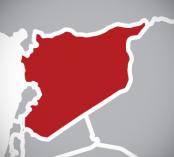
Physicians, nurses and patients are under assault by the Syrian and Russian air campaign and U.S.-backed Saudi war in Yemen.
The first Russian airstrike missed the Sarmin field hospital in Idlib, Syria, by more than 20 yards—delivering a strong enough punch to blow out some windows but sparing the lives of the rattled patients and doctors inside.
Their luck would prove fleeting.
Ten minutes later, the Russians returned and fired on the road adjoining the hospital, killing a physiotherapist, a security guard, and 10 other patients and visitors. The trauma room was transformed into a scene of broken glass, rubble, and bloodied bodies. Mohamed Tennari, a Syrian radiologist who survived the Oct. 20, 2015, attack, told Foreign Policy that staff now see the hospital — which has been attacked 15 times since 2011 — as a “a ticking time bomb.”
“We don’t know when a bomb will explode and kill us all,” he said.
Tennari and his colleagues are far from the only doctors, nurses, and ambulance drivers worrying about their safety. Attacks against hospitals and clinics from Afghanistan to South Sudan and Yemen have grown distressingly common in recent years, killing hundreds, forcing the shuttering of numerous medical facilities, and adding to the misery of already war-torn nations.
Their plight has burst into public view in recent months following a series of gruesome attacks on facilities supported by the Nobel Peace Prize-winning French medical relief organization Médecins Sans Frontières (MSF). On Oct. 3, 2015, a U.S. military gunship mistakenly struck a hospital in Kunduz, Afghanistan, killing 42 patients, staff, and caretakers while injuring 43 more. The relief agency has also taken hits in Syria and Yemen, where a U.S.- and British-backed coalition led by Saudi Arabia has fired on two hospitals and one mobile clinic supported by MSF. Scores of other medical facilities have been destroyed by the Saudi-led coalition or opposition Houthi fighters. In South Sudan, MSF facilities were recently looted in the town of Pibor after fighting in the town forced the agency’s doctors and staff to flee to a U.N. compound for safety.
In a sign of the mounting concern over the targeting of hospitals, U.N. Secretary-General Ban Ki-moon scolded Russia and Syria for “severely disrupting” humanitarian operations and damaging hospitals and schools. He also took a veiled swipe at U.S. and Saudi air operations in Afghanistan and Yemen, denouncing “so-called ‘surgical strikes’” that hit medical facilities last year as “assaults on our common humanity.”
The attacks have grown so numerous and alarming that several U.N. Security Council members have begun discussions on a draft resolution condemning such attacks and highlighting the need for combatants to observe long-standing legal obligations to leave them in peace. “We felt that by highlighting the issue it might bring some pressure to bear” on the perpetrators, said New Zealand’s U.N. ambassador, Gerard van Bohemen, who is spearheading the effort. He said that international law governing conduct in armed conflict is clear. “There is a requirement not to attack health care facilities, and it’s not being complied with.”
This article continues at http://foreignpolicy.com/2016/03/02/across-the-middle-east-doctors-are-being-killed-like-never-before/ on the Foreign Policy website.

